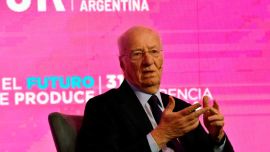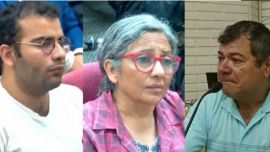The ‘Cuadernos de las coimas’ corruption notebooks case digs up one of the deepest dilemmas facing Argentine politics. How much of the undeclared money raised was for electoral campaigns under the table, a practice followed by all political parties, and how much fell by the wayside for government officials and then-president Cristina Fernández de Kirchner herself? In an interview with Modo Fontevecchia this week, Diego Cabot – the journalist who first denounced this case – said that many Kirchnerite officials live without working after leaving office, thanks to cash that they vulgarly call money “for politics.”
With evidence including registered manuscripts, the confessions of businesspeople and the testimony of whistleblowers, the case looks solid beyond the denunciations facing late federal judge Claudio Bonadio, who initiated the case, and his animosity for Fernández de Kirchner. It has been discussed whether the concept of whistleblower has been abused, with businessmen allegedly scared into delivering the desired testimony, but much of what they declared was later confirmed by forensic experts who used geolocation software to pinpoint their mobile telephones at the places indicated by the alleged records in the notebooks, along with suspicious bank movements prior to the delivery of bags of cash.
This is for sure one of the most iconic cases of political corruption in recent Argentine history. Regarding the responsibility of the ex-president, who is already convicted in another graft case and serving jail time under house arrest, it has been argued that she could not be unaware. In the Cuadernos case, the relationship between the facts and her person is even greater because bags of money allegedly went to her own home. If the money was “to fund politics” and not for her personal benefit, it should be pointed out that it is still a crime all the same and, at the very least, she is responsible for not having prevented it.
The philosopher and theologian Thomas Aquinas maintained that all legitimate power should be oriented to the common good. When rulers act to their own benefit, whether in the singular or in plural, and not the people, they become tyrants. In that case, obedience ceases to be a virtue and the citizen acquires a moral responsibility – they cannot remain passive in the face of injustice. For Aquinas, not preventing evil when you have the capacity to do so is equivalent to consenting to it so that omission in the face of the abuse of power constitutes a form of ethical complicity.
Aquinas’ reflection acquires special relevance when thinking of Fernández de Kirchner and the way in which her followers interpret her leadership. For many people, the ex-president incarnates the defence of the most vulnerable against an elite which seeks to destroy her via lawfare; for others, she represents a figure of power who did not know how or did not want to prevent the abuses committed during her term. If, as stated by Aquinas, omission in the face of evil is also culpable, Kirchnerism faces an uncomfortable question: to what degree do silence or political fidelity become complicity? In the devotion to Cristina, some see resistance and others a blindness which prevents them from recognising that power also corrupts those who say they fight against it.
It has been 40 years since the Trial of the Juntas and 80 years since the Nuremberg trials. Although absolutely incomparable, there is a German judicial doctrine which was not used in either of these two cases because it arose subsequently regarding “authorship via the machinery of power” and “dominion of the deed and responsibility for its consequences,” which takes us back to the discussion of whether who commands an organisation or heads the state is the author of what literally “expendable” officials do – a debate which is also philosophical and moral.
The case
In a brief summary, the case was launched in 2018 by the aforementioned judge Bonadio, based on the records allegedly kept by Federal Planning Ministry chauffeur Oscar Centeno, who detailed presumed payments of bribes between businessmen and Kirchnerite officials. Cabot delivered the digitised copies of those notebooks to the courts, leading to an investigation of an illicit association involving ex-officials and state contractors. The arrests, raids and declarations of “whistleblowers” marked the beginnings of this case, in which Fernández de Kirchner is accused of heading an illegal fundraising network linked to public works.
Both Bonadio and federal prosecutor Carlos Stornelli were on the receiving-end of threats and attacks, presumably due to their involvement. Attempts to intimidate their families and collaborators were denounced while several people were incorporated into witness protection programmes after testifying as indicted collaborators – among them, former Kirchner family accountant Víctor Manzanares and Centeno himself, who confirmed authorship of the manuscripts. Parallel denunciations of extortion linked to a pseudo-lawyer named Marcelo D’Alessio arose, leading to doubts over the validity of certain practices pursued by Stornelli. The original notebooks, after having been lost, were found this year and forensic studies confirmed that Centeno was their author. The court added this proof to the confessions of businessmen and ex-officials, among them 25 whistleblowers who admitted to having participated in the circuit of bribes.
This month, the Federal Criminal Cassation court intervened to accelerate the Cuadernos trial, in which Fernández de Kirchner and 86 other people have been indicted. In a decision adopted by the judges Daniel Petrone, Gustavo Hornos, Ángela Ledesma, Carlos Mahiques and Mariano Borinsky, the magistrates of Tribunal Oral Federal No. 7 were summoned to a meeting on November 18 to define ways to speed up the trial, including increasing the frequency of hearings and eliminating the summer court holiday.
When I interviewed Sergio Moro, a key judge in the ‘Operação Lava Jato’ corruption case in Brazil in 2020, he said that corruptión “impoverishes democracy” and causes confidence in the institutions to deteriorate. He maintained that the case “has expanded so much that it has reached other countries,” triggering a wave of anti-corruption in Latin America. I recently had the luck to interview Cabot. In our talk, he maintained that corruption not only finances political campaigns but also the personal lives of numerous leaders in Argentina, who live without working after leaving office. According to him, illegal financing is structural and transcends party differences since “up there, when it’s about business, there is no ‘grieta’” chasm.
Cabot explained that the Cuadernos investigation had an unprecedented value because for the first time it reached both those who received and paid bribes. He agreed with Moro’s perspective as to the importance of also investigating the businessmen, since corruption cases require both sides to function. He further highlighted that the case has a solid base with concrete evidence, such as crossed telephone calls and registering movements which confirmed the statements of those involved showing the direct relationship between payments and state favours. For the investigative journalist, the testimony of whistleblowers was a key element contributing solidity to the case since it establishes the narrative in the mouths of the protagonists themselves, affirming: “The declarations of the whistleblowers give solidity to the investigation.”
Those criticising these court cases as politically motivated lawfare rest their case on their core being, precisely the whistleblowers because their declarations would be susceptible to being obtained under duress. When I consulted Moro about the role of the businessmen, he affirmed that his investigative technique is “follow the money” and that many public and private leaders were convicted thanks to the collaboration of the accused. He further detailed that in Brazil, the condition for accepting a collaboration agreement was that the criminal return their illegally gotten gains, permitting the recovery of approximately US$2 billion. But he also highlighted that the declarations of whistleblowers should be corroborated with evidence, often obtained independently. “What we did in Lava Jato was to uphold the figure of the collaborator, or whistleblower. Corruption involves those who pay and receive and if they stay mum, we shall never know. The indicted collaborator is criticised but can help a lot. There always has to be proof. Much of the evidence was gathered independently of any collaboration but when it was used, everything had to be backed by independent proof,” maintained Moro during the interview.
Another similar case was the ‘Mani Pulite’ (“Clean Hands”) operation, beginning in Italy in 1992 with the arrest of the socialist politician Mario Chiesa. It uncovered a network of corruption involving much of that country’s leadership and business class. Headed by prosecutor Antonio Di Pietro and his team in Milan, the investigation revealed the system known as ‘Tangentópolis’ (“City of Bribes”), in which political parties – especially the Christian Democrats and Socialists – received money in exchange for favouring businessmen by awarding them public contracts. This scandal provoked the collapse of the “First Italian Republic” with the disappearance of the traditional parties and a wave of popular indignation backing the judges as the symbols of a regenerative justice. Three decades after that political and judicial earthquake, Italy continues to debate between those heroic memories and the critique of lawfare. For some, ‘Mani Pulite’ was a civic revolution which purged the state of its corruption, for others a judicial coup that destroyed parties with democratic legitimacy.
In the Argentine case, one critic of whistleblowing is lawyer Gregorio Dalbón, who said in an interview this week that 80 percent of our society does not trust judges. Dalbón, Fernández de Kirchner’s defence lawyer, assured that in the Cuadernos case “extortion and torture formed that base of whistleblowing,” comparing the methodology used in Argentina precisely with the Lava Jato operation in Brazil. The lawyer understands that many of the businessmen involved declared under pressure to regain their liberty, thus making their testimony unreliable, assuring: “There is not one scrap of evidence that supports the whistleblowers. We may infer that they said what they said to regain their freedom.”
Nevertheless, Cabot has pointed out that investigating the copybooks has permitted the exposure of how businessmen and officials mutually benefitted from a scheme of payments which drained public funds, using both confessions and the evidence obtained by crossing telephone calls and financial operations, which confirmed the facts denounced. “The evidence corroborates the testimony of the whistleblowers,” he detailed.
Knowledge
Was Fernández de Kirchner aware of the alleged scheme of corruption linking businessmen to the National Highways Board and public works? Her lawyer rubbishes the idea of money bags destined for the then-president, saying that claims of alleged illegal contributions are an excuse to mount a case against a top political leader. In this sense Dalbón maintains that the ex-president was the victim of a judicial plot hatched to damage her ahead of the elections, assuring: “It’s a novel written to hurt Cristina.”
On the contrary, Cabot affirms that Fernández de Kirchner knew of and continued the system of illegal fundraising that was initiated by her late husband, former president Néstor Kirchner, by maintaining and keeping on the officials involved in their posts. The La Nación journalist insisted that she must have known of the gravy train she inherited from her husband and decided to keep it running, arguing that after being re-elected in 2011, she could have replaced the officials involved but opted to keep them in their key posts.
Furthermore, according to Cabot, the testimony of numerous whistleblowers and others confirms that the ex-president was aware of the movements of money, even hoarding it in her own residence, adding: “There is testimony confirming that Cristina was involved.” Faced with the accusation that the case had been pushed by the administration of former president Mauricio Macri, the journalist categorically rejects the claim, highlighting that he himself was the only one to denounce the former head of the IESCA construction firm, Ángelo Calcaterra, Macri’s cousin. Cabot maintains that the corrupt links transcend political divisions and at the highest levels of power, economic interests predominate over the ideological. In that sphere, he said, the so-called “grieta” chasm is barely a distraction – while the citizenry divides itself, deals between businessmen and officials on both sides of the aisle continue.
In a recent column, entitled ‘The Power of the Socialism of Robbery,’ political commentator Jorge Asís describes the Cuadernos trial as a kind of symbolic trial of Argentine capitalism, which he describes as “dynamic indecency.” He points out that businessmen involved, previously powerful and silent, must now “get down to it” again, this time to attenuate their judicial punishment. Asís ironically writes of the “courage” of the indicted who participated in a system where “bribing to work and bribing to collect [money] afterwards” were normal practice, summing up that plot as “the magnificent potency of the socialism of robbery” – a corrupt structure consolidated under Kirchnerism.
The author traces a parallelism between the trial and the refoundation of capitalism proposed by current President Javier Milei, who presents it as part of a global ideological crusade together with US President Donald Trump and the “divine mandate” of certain religious sectors, maintaining that the courts act as a tool to demolish Peronism while Milei concentrates power with the support of faith and his messianic discourse. In his usual sarcastic tone, Asís concludes that the “reboteros”, or the “old opposition,” are only awaiting the President’s failure, because in Argentina, they write, “everything invariably goes wrong” and not even political will can manage to revert that destiny.
Nevertheless, Milei and his entourage are also implicated in grave corruption cases. Federal Judge Federico De Giorgio has recently ordered the freezing of financial assets of Hayden Davis, creator of the ‘$LIBRA’ cryptocurrency, together with those of two new names now implicated: Favio Camilo Rodríguez Blanco and Orlando Rodolfo Mellino. The measure is based on the evidence supplied by the Investigative Commission in Congress, which detected a complex network of transfers and operations abroad presumably linked to figures close to President Milei’s entourage.
According to the journalist Irina Hauser, these fresh names permit the money route to be reconstructed: Rodríguez Blanco is said to have operated a cryptocurrency exchange house in Buenos Aires’; Mellino, a 75-year-old pensioner, allegedly acted as a frontman in movements exceeding US$5 million. The freezing of assets marks a decisive advance towards possible indictments for money-laundering and illicit association while next Tuesday (November 18) a final report is expected in Congress with names and evidence which, according to Hauser, could confirm that “part of the money reached the presidential entourage.” Without forgetting the scandal of bribes at the ANDIS national disability agency, we can see that even a government like Milei’s, which says that it has come to reinvent politics and refound the country, remains trapped in the old practices of the “caste.”
The Cuadernos case thus synthesises a structural problem of unholy links between politics and big business, also posing an ethical dilemma for those who feel represented by Cristina Fernández de Kirchner by presenting the challenge of how to balance recognition of the policies of a leader and even affection for her with her penal and moral responsibilities.






















Comments